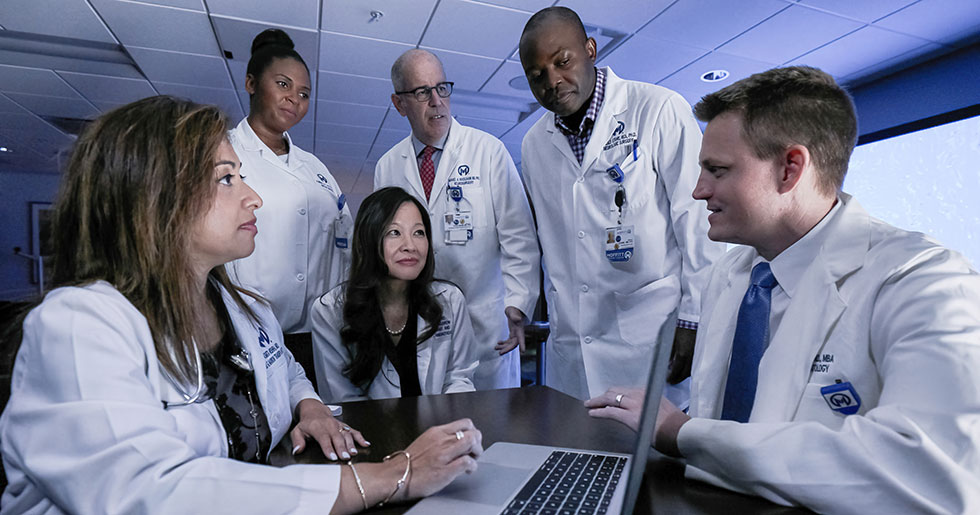Gynecologic Cancer Genetics and Molecular Medicine Tumor Board
Gynecologic or woman cancer begins in a woman’s reproductive organs. There are five main types: cervical, ovarian, uterine, vaginal and vulvar cancer. A sixth type, fallopian tube cancer, is extremely rare.
Most gynecologic cancers develop occasionally, which means they do not happen because of an inherited gene mutation. However, some women are genetically likely to get certain gynecologic cancers due to an inherited cancer syndrome. One example is hereditary breast and ovarian cancer (HBOC) syndrome, which is identified by a change in the BRCA1 or BRCA2 gene. Other cancer syndromes that can run in families include Lynch syndrome, Cowden syndrome, Peutz-Jeghers syndrome, Li-Fraumeni syndrome and Fanconi anemia.
Whether hereditary or not, however, most cancers result from gene mutations and must be precisely treated. This requires highly-specialized expertise across multiple medical and scientific specialties.

We treat gynecologic cancers with heightened precision
At Moffitt Cancer Center, our goal is to provide cancer care that is increasingly precise, proactive and impactful. We established a unique and specialized Gynecologic Cancer Genetics and Molecular Medicine Tumor Board to help ensure that each patient receives a highly targeted and evidence-based treatment plan. The Board includes gynecologic oncologists, medical oncologists, genetic counselors and other healthcare professionals from various disciplines. Working together, these experienced specialists develop treatment recommendations for our patients who have been diagnosed with a gynecologic cancer.
Our approach to precision and personalized medicine begins with a detailed evaluation of each patient’s cancer history and the results of her genetic testing. The patient’s case is then presented to the Board. Following lively and informed discussions among its diverse members, the Board reaches an agreement on a patient's best treatment plan. The Board’s recommendations are then summarized for the patient’s treating physician.
By considering each patient’s unique genetic makeup, precision medicine can target gynecologic cancers that have so far avoided effective treatment or a cure. What’s more, during discussions among the Board members, new questions often emerge and spark research initiatives, which ultimately enhance our understanding of precision medicine and guide our clinical decision-making.
Our team also provides preventative services including screening, surveillance and treatment recommendations for our patients who have been identified as having an inherited cancer syndrome.
Learn more
Whether you were diagnosed with a gynecologic cancer or were identified as having a hereditary cancer syndrome that increases your risk of developing gynecologic cancer, you can receive comprehensive care at Moffitt. We offer personalized treatment plans for patients with cancer and provide services including education, preventive strategies, full-health examinations, cancer screenings, treatment and counseling for those at risk, all under one roof.
Medically reviewed by Jing-Yi Chern, MD.
To learn more about treatments for gynecologic cancers, call 1-888-663-3488 or complete our new patient registration form online. No referral is needed.
References
Gynecologic Oncology
